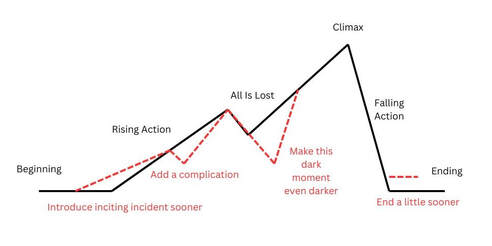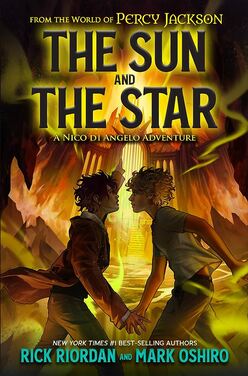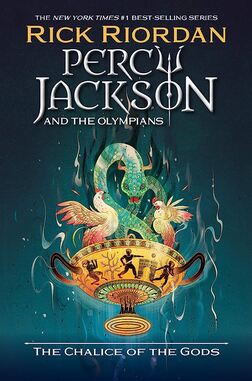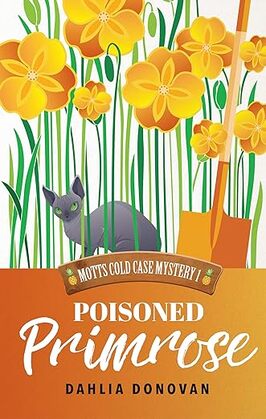|
A visual representation of a developmental edit. Made on Canva by Kate Ota, 2023 This week I'm discussing a new experience my writing group engaged me in: a developmental edit. I'd never done one before, so I read about what they entail and what to look for before starting the process and did another refresher after I finished reading the manuscript. I thought sharing my experience could help someone else who either has been asked to do a developmental edit, wants to attempt to developmental edit their own work, or is curious about what this entails.
What is a Developmental Edit? A developmental edit is what I think of as an "early stage" edit, so you're not polishing sentences, you're polishing structure and plot and character arcs. Big picture stuff that could cause you to change huge sections of the story. No point fixing a sentence in a scene that's about to be removed. A dev edit is performed after drafting (at the earliest) but before line/copy edits. In the case of my writing group, it was done in lieu of a beta read. If you hire a professional to do a developmental edit, it is generally done after beta reading. How Do You Developmental Edit? As I read, I tried to keep in mind the big picture items: plot arc and character arc. The story was pretty linear, so structure wasn't a big concern in this case. However, if reading a non-linear story, be sure to keep an eye on structure too. I made some notes in line, but not as often as I do for beta reads. I didn't correct every small typo I came across unless it affected my reading/understanding. After reading, I put together an edit letter. There are lots of outlines online for what an edit letter should contain, so I followed one of those to make sure I hit the big points: positive feedback, setting, characters, character arc, pacing, dialogue, and plot holes. I kept my feedback a big picture as possible--don't write an entire page about one setting's single problem, or one line of dialogue that didn't fit. Elements of the Edit Letter Positive Feedback: This is huge to include in a developmental edit. Since this writer was going to get edit letters from the entire group of us, that could lead to an overwhelming amount of suggested edits. It's crucial to include what worked well, so that the author knows what NOT to change, and so they don't feel disheartened if the edit letters are long or require a lot of work. Setting: Even if set in the real world, the setting will still matter to the reader. Include if you could picture the setting in each scene, what elements were often missing (think sights/sounds/smells/tastes/touches), and if you understood when the scenes took place (night/day, years, seasons, etc.). Feel free to call out great things here too, of course, especially settings you felt worked well in contrast to ones that didn't, so the author can look at their own work to see what they did and pull that into the less successful scenes. Characters: For this section, I talked about all the characters except the main character and their arc, which is the next section. Here is where you should things like the number of named characters (overall or in a particular scene were there too many? Too few?), the names of characters (were any too similar? Did the author accidentally use a celebrity/infamous/famous character name?), and the purpose of side characters (could any be combined? Did you mix any up? Was there someone you felt was missing?). Positive feedback can go here too, like naming a favorite side character and why, mentioning a great character moment, etc. Character arc and pacing: I followed Save The Cat Writes a Novel as my guide for when certain beats should have hit, and used that to inform me on pacing, though often I could tell by gut if anything was running too long or happening too soon. Save The Cat acted like a nice quantitative measurement to back me up and help the author figure out how much to move their beats. The same is true for pacing plot and pacing the character arc. They should be two separate sections in the edit letter, despite the similar method. Character arc is the beating heart of a novel, so be sure to pay special attention to it: did the character complete their arc successfully? Did they have a lowest moment? Was the character arc driving the plot arc or vice versa? (The "correct" answer for that one will depend on genre, though agents right now love to talk about character driven stories.) Dialogue: Feedback here should include whether the dialogue felt natural in general (there will always be exceptions, like a character who is using a second language might be a little more stiff), if dialogue from different characters felt too similar, and if the dialogue to narration balance felt correct. That last one will depend on genre and taste, but go with your gut. This is also a place for positive feedback: did anyone have a great one liner that made you laugh? Did any character have stand out dialogue in general? Plot Holes: A little more general than the plot beats discussed in the pacing section, the plot hole section is where you discuss other problems with the plot or world. Even if set in the real world, there can be holes (for example: you may have to tell your author that Interstate 80 doesn't go through Colorado, it goes through Wyoming). More often, you'll need to point out questions that come up around "why did the characters do X and never even thought of the much easier method Y?" You may, but you don't have to, suggest possible solutions. However, don't get attached to your ideas, as the author may come up with a different solution that works better for them. If there are other thoughts or comments you have left over, feel free to add more sections. For different genres, you may need other sections such as Romance, Magic System, Alien Culture, Mystery Elements, etc. Every story will be different, so feel free to write an edit letter that best suits the manuscript you're editing. In the end, you'll send your edit letter to your author and hope for the best. Keep in mind, everything you're written in your letter is a suggestion, not a legal requirement. If the author loves and incorporates all of your feedback, hooray! If the author ignores every word you wrote, well, it's their novel. Odds are, something in the middle will happen, and that's great too. All you can hope for us that the author takes away at least one thing from your letter to make their book better in their eyes. Some Quick Don'ts
Have you ever done or received a developmental edit? Was it worth it? Do you recommend your editor? Let's discuss in the comments!
0 Comments
Not one but two new books in the world of Percy Jackson and the Olympians (PJO) dropped in 2023: The Sun and the Star (Rick Riordan and Mark Oshiro) and Percy Jackson: The Chalice of the Gods (Rick Riordan). As a longtime PJO reader, I had to read these. I've been bad and skipped the Apollo series and I think these books spoiled a couple key events in that Apollo series, so if you're not caught up and don't want spoilers, finish the Apollo books before reading these two. The Sun and the Star published first, but is later in time. If you want to maintain total surprise in the timeline, read The Chalice of the Gods first.
The Chalice of the Gods is a classic PJO story. Percy needs three letters of recommendation to get into the university in New Rome with Annabeth. To get a letter, he has to do a quest. We're back to the classic trio of Grover, Annabeth, and Percy getting into trouble with figures from Greek myths. It gives the vibes of the first two or three PJO books but with older protagonists. Nostalgia galore. The Sun and the Star follows Nico, Hades's shadowy son, and Will, a child of Apollo, as they travel to Tartarus to retrieve something very important left behind when Percy and Annabeth visited in The House of Hades. While Nico is immune to many of Tartarus's dangers, his true love Will isn't so lucky. Both books were nostalgic, lightly/sweetly romantic, and a great read overall. A little older than readers who are just starting on the world of PJO (book 1 is Middle Grade after all), but it's perfect for readers who have read all the books up to this point. I know I normally list negatives here, but honestly, no notes. The Sun and the Star and The Chalice of the Gods are for you if you like the other PJO books, if you've been waiting for Nico and Will to get more narrative attention, or if you like Greek mythology. The Chalice of the Gods is a good entry point for readers new to the world, if you're intimidated by the backlog of other books in the series. These books are not for you if you're not going to be onboard with a gay romance, if you dislike PJO books (let's not discuss the live action movie), or if you need your books to take everything very seriously. Since Goodreads removed Middle Grade as a category in their Best Books of 2023 awards, shout out your favorite middle grade books in the comments to shine some much deserved light on them! Look at that sphynx! With a cover like that, I couldn't say no! I stumbled on Poisoned Primrose (Motts Cold Case Mystery, Book 1 ) by Dahlia Donovan when looking for an indie published cozy mystery to read. My goal this year was to read nine indies and I was behind, but I also wanted an indie in a genre I hadn't read indie before. When I saw the cover of Poisoned Primrose, I knew I needed to read it. It is book one in a series which also includes Pierced Peony, Pickled Petunia, and Purloined Poinsettia.
This book follows Motts, an autistic and asexual middle-aged woman and her sphynx, Cactus, who move into a late relative's cottage in a small English town. She knows the villagers, as she spent many childhood visits there, so there's a strong returning-to-small-town vibe. As Motts redoes the garden, she finds a very dated dead body. Motts pokes around to learn more about the victim and those who knew her, but the killer doesn't appreciate Motts's interest. I liked the portrayal of the sphynx cat, Cactus, it was 10/10. The author either has or has lived with one, I'm sure. Cactus was my favorite character. I liked that the main character was written by an autistic author. I've read a couple books now about an autistic main character written by neurotypical authors and they get quite cringey with the stereotypical portrayals. I liked that this book avoided that! I also liked how Motts's asexual identity was respected and represented. Unfortunately, the mystery was not clear enough to me. I didn't even have a sense of the age of the victim or why she was buried in Motts's garden at all. I was left without the sense of satisfaction that a solved mystery normally leaves me. I also had no idea what most characters looked like, so it was hard to picture some scenes. Overall, this book is for you if you're looking for authentic autism or asexual representation, if you want to fall in love with or learn what it's like to own a sphynx, or if you prefer mysteries about cold cases. It is not for you if you want all your questions answered at the end of a mystery, want a romantic subplot involving spice, or a prefer fresh dead body in your mysteries. Have you read Poisoned Primrose? Do you recommend other indie cozy mysteries? What other books have great autism rep? Let's discuss in the comments! |
Archives
April 2024
Categories
All
|





 RSS Feed
RSS Feed